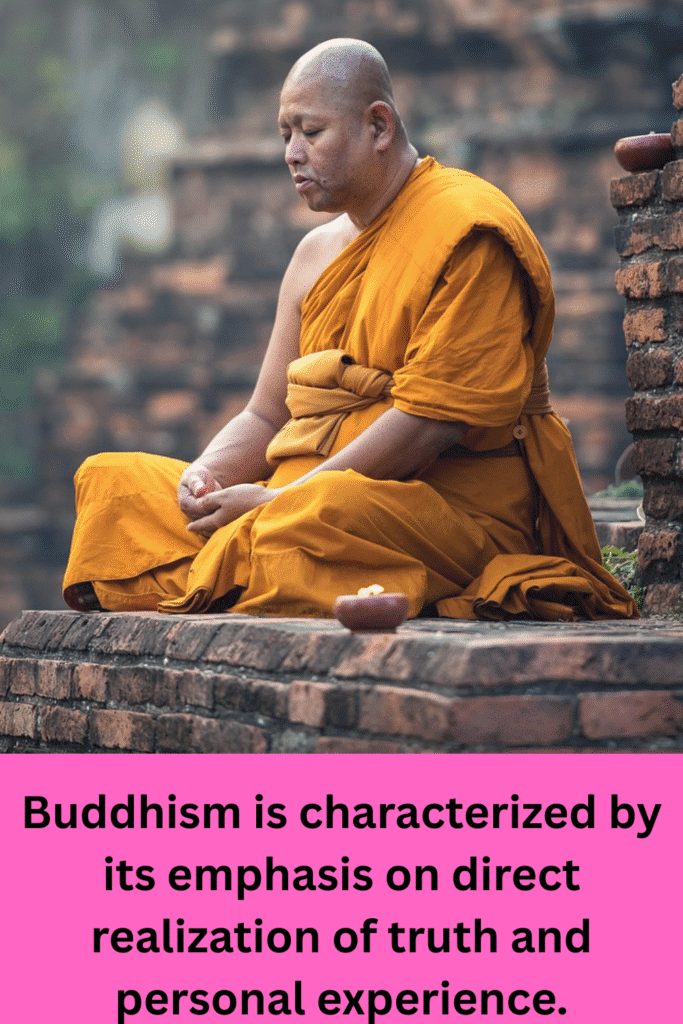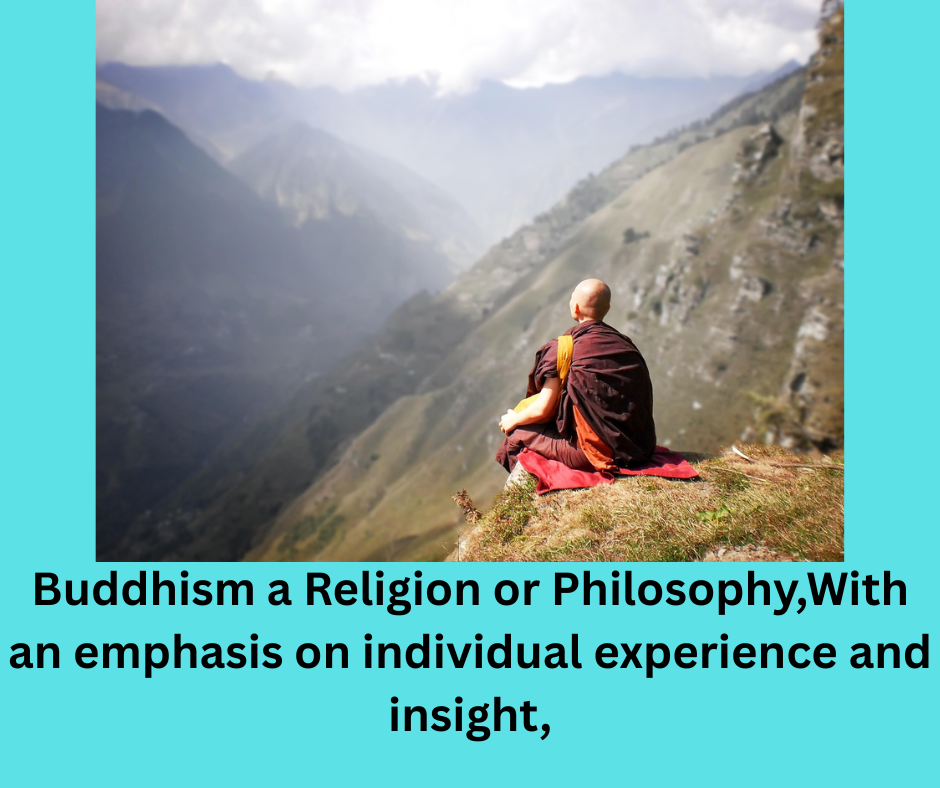Buddhism a Religion or Philosophy, People following Buddhism are found all over the world, due to which Buddhism has become one of the spiritual traditions in the world. It was established in India between the fifth and fourth centuries BCE by Siddhartha Gautama, also referred to as the Buddha,

whose teachings centered on the causes of suffering, there is a path to end suffering and attain knowledge Buddhism has had a significant influence on many countries’ cultures, ideologies, and spiritual activities as a belief system.
Table of Contents
Nonetheless, there is still much debate over whether Buddhism is a religion or a philosophy. While some see Buddhism as a philosophical system free of supernatural beliefs, others see it as a profound spiritual journey with religious overtones.
Whether Buddhism is a religion or a philosophy relies largely on one’s definition of “religion” and “philosophy,” and the wide range of Buddhist practices, schools, and interpretations makes this distinction even more difficult to make. Buddhism as a religion and Buddhism as a philosophy will both be discussed in this essay.
Buddhism as a Religion
When considered as a religion, Buddhism shares many characteristics with other religions around the world. In this we get the education of complete knowledge about life, death, afterlife and existence of life. Buddhism a Religion or Philosophy,It gives activities and rituals meant to accomplish spiritual objectives, stresses ethical behavior, and offers a moral code for how one should live.
The Four Noble Truths and the Eightfold Path
The Four Noble Truths, which form the cornerstone of Buddhist philosophy and practice, are at the core of Buddhism. These facts discuss the nature of suffering and provide a way to end it:
1. The Truth of Suffering (Dukkha): Whether it is discontent, emotional anguish, or physical pain, suffering is a part of life. A basic feature of the human existence is this suffering.
2. The Truth of the Cause of Suffering (Samudaya): Ignorance and desire are the root causes of attachment or craving (tanha), which is the source of suffering.
3. The Truth of the Cessation of Suffering (Nirodha): By eradicating attachment and craving, suffering can be put a stop to.
4.The Veracity of the Way to End Suffering (Magga) – The Noble Eightfold Path—right understanding, right intention, right speech, right action, right livelihood, right effort, right mindfulness, and right concentration—is the way to eradicate suffering.
The Role of the Sangha and Monastic Life
Buddhism comprises the Sangha, or community of practitioners, in addition to its teachings and practices. The group of laypeople, monks, and nuns who all pursue the same path in Buddhism is known as the Sangha. Many types of Buddhism place a strong emphasis on the monastic life, in which monks and nuns devote their lives to studying, practicing meditation, and imparting the Dharma, or teachings of the Buddha. Buddhism a Religion or Philosophy,Common locations for worship, meditation, and social gatherings are monasteries and temples.
Buddhist Rituals and Worship
Buddhism emphasizes meditation and individual practice, but many varieties also incorporate ritual and devotion—aspects that are typically associated with religion. The different schools of Buddhism, especially those like Tibetan Buddhism, Theravada Buddhism, and Pure Land Buddhism, frequently practice rituals including prayers, offerings, and mantra chanting. Developing spiritual merit, honoring the Buddha, and demonstrating devotion to the path of enlightenment are frequently the goals of these rites.
In Buddhism, great emphasis is placed on the values of love, kindness and compassion.Meditation is frequently used to acquire these values, which are then applied to all sentient creatures. Buddhism a Religion or Philosophy,Similar to religious laws, the ethical precepts of Buddhism, such as abstaining from murdering, stealing, lying, or engaging in destructive activity, offer followers a moral code to live by.
The Concept of Karma and Rebirth
The idea of karma and reincarnation is another aspect of Buddhism that is consistent with other religions. The law of moral cause and effect, which states that an individual’s acts, whether good or evil, have repercussions, is known as karma. While bad behaviors cause misery, good ones produce favorable outcomes.
This karmic cycle affects how a person’s subsequent lives unfold. Buddhism a Religion or Philosophy,The Buddhist concepts of rebirth and karma emphasize the value of moral behavior and mental discipline, inspiring adherents to work for spiritual growth.
While some Buddhist traditions place more emphasis on these religious components, others place more emphasis on the inward, contemplative aspects of the practice and less emphasis on ritual worship. Despite this, Buddhism shares many characteristics with other world faiths in terms of doctrine, practice, and organization.
Buddhism as a Philosophy
However, Buddhism is viewed by many as more of an intellectual system than a religion. Buddhism does not necessitate believing in a supreme deity, in contrast to certain other religions that place a strong emphasis on faith in a creator God or divine entities. As a teacher who learned about the nature of existence via his own meditation and experience, the Buddha himself never professed to be a god or divine entity.
As a result, Buddhism can be viewed as a philosophy that emphasizes comprehending the nature of suffering and the mind while providing useful resources for developing insight, wisdom, and mindfulness.
Emphasis on Personal Experience and Understanding
Buddhism is characterized by its emphasis on direct realization of truth and personal experience. The teachings of the Buddha are frequently seen as instructions for people to reflect on their own lives and meditate in order to comprehend the essence of reality. Buddhism a Religion or Philosophy,Buddhism thus urges people to develop insight into the transient and linked nature of all events and to critically analyze their ideas, deeds, and perceptions.
The Concept of Emptiness (Shunyata)
Meditation is a key component of this philosophical perspective. Buddhism views meditation as a philosophical technique for gaining mental clarity and comprehending the mind, not only a religious practice. Practitioners aim to observe the nature of their thoughts, feelings, and sensations without attachment or aversion by using practices like samatha (concentration meditation) and vipassana (insight meditation). A major objective of Buddhist practice is the cultivation of wisdom (prajna), which is facilitated by this process of self-examination and mental discipline.
The idea of voidness is considered an important philosophical component of Buddhism, the idea that all phenomena are devoid of intrinsic, independent existence.Buddhism a Religion or Philosophy,This concept is fundamental to Mahayana Buddhism and its view of the Middle Way, which steers clear of the extremes of nihilism and eternalism. Emptiness suggests that there is no permanent, unchanging essence and that everything is interrelated and ever-changing.
This philosophical theory encourages practitioners to gain a better knowledge of impermanence, interconnections, and the nature of reality by challenging traditional conceptions of the self and the universe. Since it enables people to overcome attachment, ignorance, and delusion, this realization of the emptiness of all phenomena is seen as a critical step toward enlightenment.
Practical Ethics and the Cultivation of Wisdom
Buddhist philosophy places a strong emphasis on developing moral qualities like equanimity, compassion (karuna), and loving-kindness (metta) in addition to meditation. These qualities serve as the cornerstone of the Noble Eightfold Path, which is a framework for cultivating wisdom, moral behavior, and mental discipline in addition to being a collection of moral precepts.

Buddhism urges followers to act in ways that advance harmony, peace, and understanding as well as to live in a way that reduces suffering for both oneself and others. In Buddhism, the means of attaining salvation is a product of the concept of introspection and practical application of knowledge.It provides a foundation for leading an ethical and thoughtful life, emphasizing personal development over devotion to or worship of a deity.
Conclusion:
In conclusion, depending on one’s perspective, Buddhism can be viewed as either a religion or a philosophy. It is a religion that encompasses activities like meditation, ritual worship, and virtue cultivation in addition to teachings regarding karma, rebirth, suffering, ethics, and liberation.
Buddhism a Religion or Philosophy,With an emphasis on individual experience and insight, it provides a thorough framework for comprehending the nature of life, the mind, and the road to enlightenment.
Buddhism’s rejection of the concept of a supreme deity and emphasis on introspection and meditation may make it seem more like a philosophy than a traditional religion. However, its rituals, moral principles, and spiritual goals give it a religious element for those who view it as a path to enlightenment and liberation.
Whether Buddhism is classified as a religion or a philosophy ultimately depends on one’s perspective of view. For many practitioners, it is both—a style of life that leads to the end of suffering and a living tradition that provides intellectual insight—that directs their spiritual path.